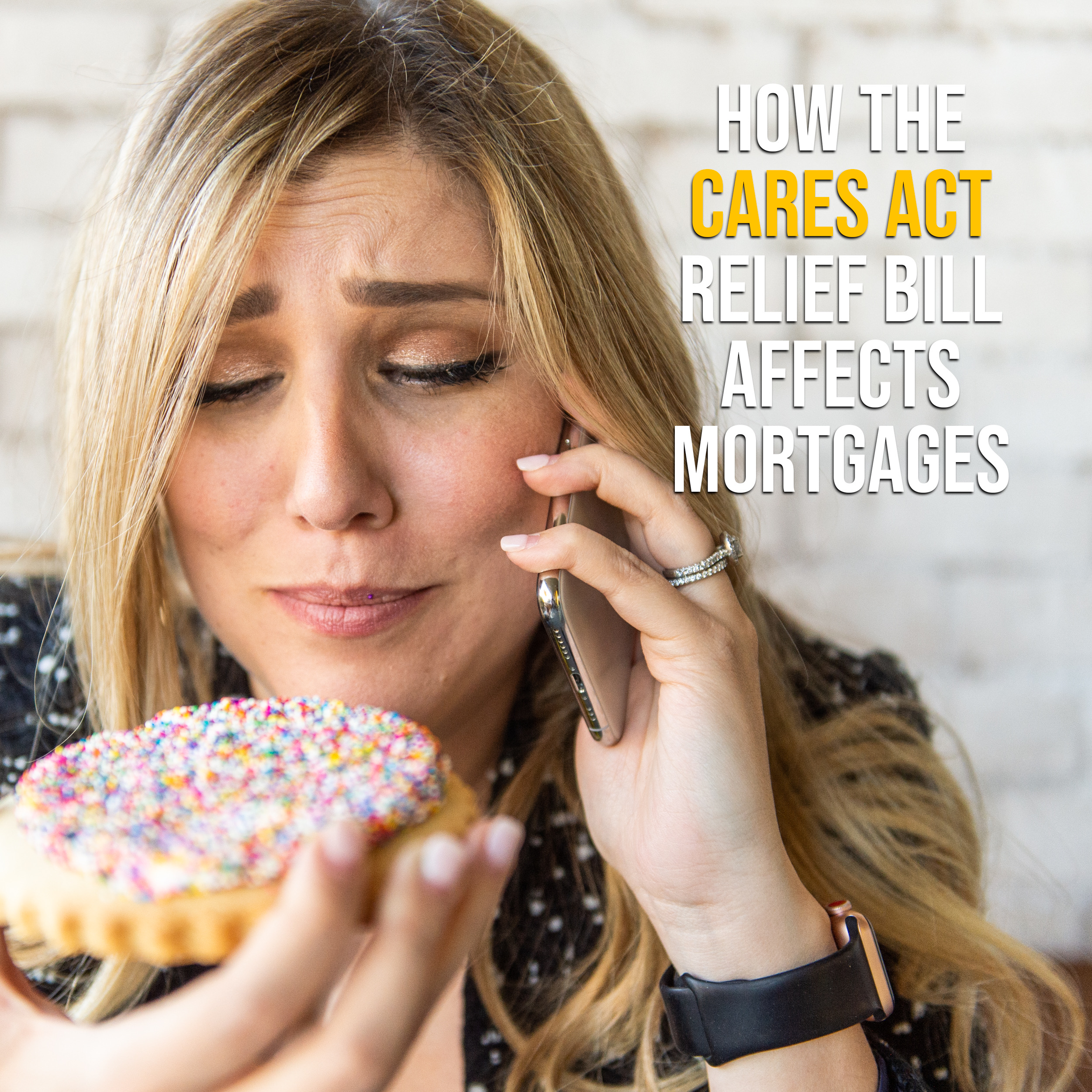Blog
This week it seemed like it was a good idea to take a look back and answer some of the questions I’ve had over the past few months! I love hearing what people need help with, and the whole point of this channel is to give practical everyday advice to those who are looking for it! So keep those questions coming! I’m here to help, and always do my best to answer them 🙂
Am I really a “first time home buyer”?
Question 1: Manny inherited a home in 2010, but now he and his fiance would like to purchase a home together. So, Manny is wondering if he qualifies as a “first time home buyer”.
You’d probably be surprised how often this kind of question comes up! It’s not uncommon for someone to inherit property through an estate, and that usually brings questions about what kind of programs someone will qualify for after.
For the purposes of mortgages, “first time home buyers” are considered people who have not purchased a home in the last three years. So since he inherited the home over three years ago, he would be considered a first time home buyer. Obviously we’d have to take a close look and make sure there are no other conditions that need to be met, but with just this information, he qualifies for all the first time home buyer benefits.
Also, something to keep in mind, for most mortgage programs, you only need one of the people purchasing to be considered a first time buyer for the couple be able to take advantage of these.
Are home prices going to keep going up?
Question 2: MH wrote in and let us know that she and her family wanted to purchase a home last year, but due to personal financial circumstances, could not. Now prices have increased, and keep increasing, and she wonders if the market will “stabilize” and prices will stop going up.
So this is a tough one to predict- it’s really hard to say if prices will keep going up. At the current moment, there is a lack of supply and a large demand for homes, so there’s no immediate indication that prices would drop. However, because interest rates are SO low (like seriously historically low), you actually have more purchasing power than you would have a year or two years ago. As a result, even with a higher sale price, your monthly payments may end up being even lower than they would have for the same home a couple of years ago.
What’s a donor letter?
Question 3 – Thea Davis asks “What’s a donor gift fund statement?”
Very often, people have help from loved ones when it comes to purchasing a home. That brings up something called a “Donor Gift Fund Statement”, which is simply a document that your lender will provide. This statement is filled out by whomever is giving you the money, and has them state their relationship with borrower (you), what the amount is, what the source of the funds is, and that it’s a gift (it doesn’t need to be repaid).
This document really serves to verify that the funds are in fact a gift, and there’s no requirement for repayment.
Can I buy a bigger house if I buy with someone else?
Question 4: This question comes from Trigger Happy 134. They were looking for a 4 bedroom home, but now realize that they need to look for a larger home to have space for their parents to move in with them.
Moving in with aging parents is a big deal, and it’s absolutely something you can plan for when applying for a mortgage! The most important thing to do here is discuss with your family member what your strategy is going to be, and definitely put an exit strategy in place in case circumstances change in the future. And honestly, that’s the same discussion you should have with any person you’d consider buying a home with!
That being said, if you are purchasing the home together, you will both have to submit applications, you will both have to provide financial documents. But this also means that you will most likely have expanded purchasing power, and more options.
What do I need to know before I buy a car?
Question 5: Kajung writes in to ask what they should know before they buy a vehicle.
This is such a great thing to be thinking about!! First of all, it is SO important to do as much research as you can up front. You want to be armed with as much knowledge as possible. Then, when it comes to negotiating with the car salesperson, let them know what you have found when it comes to other prices, ask them what they can do for you, and then BE QUIET. I cannot stress this enough- when it comes to negotiating, it’s important to know when to shut up! If you let them know you’re an educated consumer, and also let them know what your budget is, you can shut up and let them give you their best price.
Is taking cash out of your home the same as having a line of credit?
Question 6: Jessica asks, what’s the difference between cash-out refinance and home equity line of credit?
So a cash out refinance is something that is rolled into a single mortgage on your property. A home Equity Line of Credit (HELOC) is actually a second mortgage that follows the first, and has an adjustable interest rate. But with a HELOC, you can pay it down and charge it up on an as-needed basis.
I actually recorded an entire video on what you need to know before refinancing, which has lots of information to consider before doing any type of refinance!
How to budget when you’re self employed?
Question 7: Mitchell asks us the SUPER common (and great) question of how to budget when you’re self employed.
I feel you on this one- I’m not technically self employed, but I also don’t have a regular consistent salary. So many people have this same challenge, and I promise it’s something you can manage with a little bit of time and planning.
My best advice here is to look back over the last two years of both income and expenses and take an average. Once you’ve done that, set aside the amount of money that the average revealed.
Some people like to do this by setting aside the exact number, and others do it by percentage.
I personally do it by percentage, and I make sure that money is automatically sent to an account that all of my regular expenses come out of. The reason I like this method is because so often, people spend whatever they make as soon as they get it, and then don’t have anything left over for anything else.
If you’re having trouble figuring out how to budget for your personal expenses, download our free budget guide! Budgeting will help you plan for the future, and make those inevitable ebbs and flows much easier to manage!!
May 4, 2020

With every day that goes by, we all seem to find ourselves wondering what ways we’re going to see both health and economic impacts during this pandemic. So today, I wanted to talk about what homeowners, and people who are in the process of purchasing a home, might be experiencing in this turbulent financial market.
Fed Fund Rate vs. Mortgage Rates
Before anything else I think it’s important for people to understand that the “Fed Funds Rate” is not the same as mortgage interest rates. The Fed Fund Rate is the rate that the Federal Reserve designates for loaning money to banks and businesses for overnight liquidity. So when the Fed announces that their rate is zero, it does not mean that MORTGAGE rates are at zero. Mortgage rates are in the 3-4% range. That is historically low, but I don’t want anyone to confuse it with the zero percent Fed Fund rate.
Varying Rates Between Banks
Pre-COVID, when it came to mortgages, Interest rates didn’t vary much between banks. You could ship around, but in general, rates at different banks were very close (often within a quarter of a percent) to one another.
Today, we’re seeing significant differences in rates from bank to bank (often over a whole percentage point, or sometimes more). This has nothing to do with how much a loan officer is making on the transaction, but has everything to do with bank liquidity. Depending on the strength of the bank, the loan program, credit, debt to income ratio, etc… any risk factor that may be present will increase the rate of interest in today’s market.
So what are Risk Factors?
If you’re in the process of acquiring a home loan, your loan officer is going to be looking at several things that are considered possible risk factors and how they are going to affect your probability of repayment. When determining ability to pay, we’re looking at employment history, strength of credit, income, etc. When determining risk factors, we’re looking at debt-to-income ratio, overdrafts, deposits, etc. In today’s climate, every lender across the board is looking much more critically at how you make payments, what debt you have, etc. in order to determine your likelihood of repayment.
I know that this may seem like extra hoops to jump through, and can be downright annoying. But the good news here is that there is still plenty of financing available, especially if you’re borrowing under $510,500.
What is a Jumbo Loan?
Borrowing an amount over 510,500 is considered “Jumbo” financing, and has its own set of rules. Some banks are no longer offering Jumbo programs, and those who are have higher levels of scrutiny to contend with during our current economic shift. To be clear, not every bank has abandoned jumbo financing. It just means that there have just been a lot of changes- you might just have to look into different banks rather than the big box banks. If you are seeking Jumbo financing, it’s important to stay informed throughout the process as this situation is so fluid.
The same holds true with things like bond financing and down payment assistance programs… not all banks are offering them anymore, but they are absolutely still available. If the bank you chose no longer offers what you’re looking for, be sure to look to different banks and lenders.
What Isn’t Available Right Now?
If you’re a consumer who needs financing outside of the box, like bank statement financing, or foriegn investors (typically called non QM loans)… you’re going to have a hard time finding it. That type of financing was typically found through investors and hedge funds. As the market declined, that financing was pulled. To be perfectly candid, I don’t know when that will come back. In the last recession we saw it take about 10 years to return. I genuinely don’t know if that will be the case this time, so we will just have to wait and see what develops in the coming months and possibly years.
Why can’t I “lock”?
ANother peculiarity in this environment is that banks are having to pay very close attention to how many loans they issue because of liquidity issues. They are having to make sure they they have warehouse resources, that they won’t have margin calls on their available resources, and as a result, are limiting the amount of rate locks that can happen within any given time period
What this means for you, if you are in the process of buying a home or refinancing (especially if you are refinancing) you may not be able to lock in your interest rate at the very beginning. This is common right now. But it’s not the worst thing in the world. Rate are incredibly low right now, and since the government is buying all mortgage backed securities, this trend is likely to continue for at least the next 30 days.
Forbearance vs. Deferment vs. Modification
I spent some time talking about this in detail a couple weeks ago (you can see that video here) But I want to bring this up again because it is SO important right now. There are differences between forbearance, deferment, and loan modification.
Forbearance does not mean forgiveness, it does not mean deferment, and it does not mean loan modification. It means that you are able to delay your payment for up to 90 days. But when that time is up, you owe all those payments. A forbearance does not automatically happen. You have to apply, and that application is reported to credit agencies. It does not negatively affect your credit score, but they do have an impact on your ability to borrow in the future.
My warning against doing this is to only seek this sort of relief if you absolutely have to. In the past when people have sought a forbearance, they were prevented from getting new financing for a number of years (up to seven!). We don’t have guidelines out right now to determine what
will happen as a result of COVID related forbearances, but I will say that if you are still able to make your payments, you should.
Deferment programs are slightly different in that whatever payments would have been made during the deferment period are simply tacked on at the end of your loan term, and they still accrue interest as they normally would.
Loan modification means that you’re either breaking up late payments over a course of time to be paid along with your regular payments, or you’re lowering your payment, but you are still responsible for the entire amount by the completion of your loan.
All of these can be a great move if you want to stay in your home and you know that you’re going to get back on your feet. My only warning is that if you’re seeking a forbearance, only do it if you know that you will have a large sum of cash available to you by the end of your forbearance period so that you can make the payment that will be due.
I’ve lost income- can I still buy?
This is the type of news that every loan officer hates to give: If you’ve been furloughed, or lost your income, it will have an impact on your purchasing power and ability to qualify.
You may be wondering if you can use other income to make up for what was lost. As a basic rule (any time, not just during this pandemic), if the lender cannot “rely” on the income – things like bonuses, overtime, shift differentials – they can’t include it.
So just please be aware that if you’re looking to use “other” types of income to apply for a mortgage, they’re subject to an analysis of their stability. Same goes if you’re self employed. Lenders want to know that your business is still making money, so they may ask for invoices, current receivables, profit/loss statements, etc.
And on a positive note, if you have been furloughed or are unemployed, if that gap is less than 6 months, we will be able to use that income again for your home loan. Not all hope is lost!
So hang in there, and if you have specific questions, I really am happy to answer them. Take care and stay well!
April 13, 2020

We’re living through unprecedented times. With the pandemic starting to rear its ugly head in our country, we’ve already seen economic disruption, and are bracing for much more. In an effort to mitigate the damages, our federal government passed a financial relief bill that addresses both individuals and small businesses impacted by COVID-19. CARE ACT
So today I want to talk to you about how that relief package is affecting the homeowners and the housing market, and what some of your options are as we as a nation face a difficult economic situation.
IF YOU READ NOTHING ELSE, READ THIS:
Before anything else, the MOST IMPORTANT thing I can tell you right now is that if you are under financial distress as a direct result of COVID 19 and cannot pay your mortgage, you have to contact your mortgage servicing company. This federal relief act does not mean that your mortgage payments automatically stop. It simply enables you as a homeowner to apply for relief and be protected from financial hardship as it relates to your mortgage.
As an overview, this bill puts a halt on all evictions and foreclosures for a period of 60 days. There is already talk of extending this period, but as of this writing, this halt extends through May 2020. So, if you find yourself in a COVID 19 related financial hardship, this bill gives you 60 days to figure out your next steps as it relates to your mortgage.
The Difference between Forbearance and Deferment
The forbearance part of this act means that there is a hold on evictions and foreclosures. If you are financially impacted by COVID 19, you have a period of time that you are not required to make payments. Then when that grace period is up (in this case, two months), you will have to make both your regularly scheduled payments, and make up for the payments that would have occurred during the grace period. Depending on your circumstances, you will either have to pay that amount up front, or you will make modified payments along with your regular payments.
Deferment programs are slightly different in that whatever payments would have been made during the deferment period are simply tacked on at the end of your loan term, and they still accrue interest as they normally would. This is really similar to the way student loans work. The thing to note here is that you have to be able to prove that this is a COVID 19 related hardship, and the deferment period (for now) is only 180 days. So if you had job loss prior to the pandemic, it does not qualify. At the current moment, only Fannie Mae and Freddie Mac have issued guidelines on deferments, but I do anticipate more to come in the weeks ahead.
So in summary, the CARES Act impacts the housing market by injecting liquidity (in the form of direct payments to tax payers- read more on that HERE, halting evictions and foreclosures, and offering deferments to those in need.
How mortgage banking works
This is a hefy topic, but I’m going to do an extremely simplified overview as it relates to what’s going on right now.
Once a home loan is closed, it is transferred and managed by a mortgage servicer (the bank you make your payments to). The asset (closed loan) itself is sold to investors or a government agency like Fannie Mae, Freddie Mac, or Ginnie Mae (FHA/VA). The servicer’s role is extremely important because they collect payments from the borrowers and pay property tax insurance and handle customer service related questions/issues. They are also responsible for timely payment to investors (in this case, the government) who buy pools of these loans through investments called Mortgage Backed Securities (MBS).
The reason it’s important to understand this right now is because the CARES Act does not provide relief or guidance for Servicing companies. Which means that if a homeowner stops paying their mortgage, the service provider is STILL on the hook to pay the investor (the government). This is why it is SO IMPORTANT for people to continue paying their mortgage if they are still employed. It was this exact problem that contributed to the housing crisis in 2008. People who still had an ability to pay stopped, and then servicing companies were not able to fulfill their obligations to investors.
My advice
I know this is not going to be the popular opinion, but I truly believe that if you have equity in your home, and you are in a position (for whatever reason) where you can no longer afford your mortgage, you should sell. That way you can figure out housing that is within your budget (which may be dramatically different now), pay off your debt, and still have assets left. This will leave you in a stronger financial position on the other side of this, rather than deeper in debt.
Also, for those of you who find yourself suddenly unemployed, and don’t know what to do next, I really believe that there is serious value in work, and there is work to be found right now. So many groceries are hiring, and delivery services too. Obviously, I don’t want anyone to put themselves or their families at risk. But if it is a possibility for you, don’t feel bad for stepping away from whatever your chosen work was to do something in the interim. It may not be what you want to do with your time, but, if the choice is giving up or doing an honest day’s work, DO THE WORK. We all need to do what we can to help pull ourselves and our communities out of this.
In closing, please stay safe out there. Stay healthy, and be well. We WILL get through this, and as always, if there are any questions I can help answer for you, please don’t hesitate to reach out.
March 31, 2020

The world we’re living in has changed dramatically, and keeps changing day by day. Keeping that in mind, I want to deliver the most relevant and practical advice and information I can to you right now, and will continue to do so as we all ride this crazy rollercoaster.
We are in uncharted territory. Many of the events of the past week were unprecedented, and there are sure to be more. So I want to talk to you about what is happening right now, and what I see happening in mortgage banking for the next 6 months based on where we are right now. Now more than ever, we cannot predict what happens next. But we can and will get through this together.
The week of March 16th-20th, we saw massive and unprecedented changes in our financial markets. The bond and stock markets crashed, and Mortgage Backed Securities (MBS) were not purchased by anyone. The result is that we now have a banking crisis.
Last week, many people who are in the midst of the home buying process heard that they could not lock in their rate. The mortgage market was moving too quickly for banks to be able to hedge and determine pricing. We saw that the mortgage bond market would be stable at opening because the government was buying the mortgage backed securities, and then as soon as those purchases were finished, that market would crash. There was no stability. As a result, many banks did not issue rate sheets, some limited refinancing.
I’m telling you this so that if you are either in the process, or about to purchase a home, you understand what mortgage companies are facing right now. I do believe the mortgage market will stabilize, and if you were able to lock in your rate last week, then great. And if you’re about to purchase, it’s going to be ok. Just be aware of what is going on, and be sure to have a candid discussion with your loan officer and realtor about what they are seeing, and what your best options are while rates fluctuate so rapidly. They may recommend “floating” your rate right now, which is actually what I am recommending to some of my current clients, depending on their circumstances.
Bank Liquidity
It’s worth a deeper dive to understand why mortgages are affected just like the rest of the financial markets are right now. It has to do with liquidity. Banks have a limit to the number of loans that they can fund. They way they replenish that fund is through the sale of mortgage backed securities and of loans.
When mortgage rates dropped so dramatically, so many people wanted to refinance that it actually maxed out banks capacity to fulfill the lending demands. Without anyone purchasing MBSs (which is how they replenish their ability to lend more), the banks ran into a liquidity issue because they didn’t have the liquid funds to lend out.
So why are investors not buying the mortgage backed securities? Because in our current crisis, this pandemic is causing people to lose jobs and income. We’re seeing people go on furlough, and in general, there is nothing but uncertainty for so many. This gives investors the feeling that the likelihood of people defaulting on loans is much higher than in previous years.
Considering all of this, I think that in the short term, the government will end up purchasing all mortgage backed securities, much like they did back in 2008-2009. And I do think that will help to stabilize the market. And also, at this point, I actually feel fairly confident that the government will come up with a stimulus plan that will also help with that stability.
So what now?
Even though this situation is evolving and changing daily, from what we’re seeing right now, it seems that the peak of this pandemic will affect the US this summer. That means that the income for so many, especially in the service industry, will be impacted for a long period of time. I don’t know how that will affect mortgage guidelines yet. As of right now, the rules have not changed. But I do anticipate that there will be new requirements for additional verifications of income and assets for people seeking home loans. I will keep you posted if and when that happens, but it’s a pretty safe bet looking into the foreseeable future. I also think that down payment assistance programs may not be available in the near future.
But it’s not all bad news. I do think that there are going to be a lot of late payment/forgiveness programs, and many states are already asking companies not to report late payments to credit bureaus.
If you have equity…
I always tell people to not sell their homes in a time of panic. And that still absolutely holds true. If you still have your income, what is happening right now is no reason to sell. Truly.
However if you have lost your income and have no savings, considering selling your home is not a panic sale. Homes are investments, and if you need to cash your investment to survive, that’s what it’s there for. It’s important during times like these to weigh all of your options, and if cashing in on the home investment you made is going to get you through this, that’s ok.
I also want to point out something that I think helps with perspective- a recession DOES NOT equal crash in home value. We have had almost sixty recessions since this country was founded, and only two of them negatively impacted home values. Typically, during a recession a home is a stable investment because it is not subject to the same fluctuations of the market.
In fact, right now in Arizona we have had HUGE influx of people, and not enough homes on the market to keep up with the demand. So rents have gone up, and people are looking to buy.
So let me repeat, do not firesale your home if you don’t have to. If you are in a position where that is how you will financially survive, by all means, take refuge in your investment. But otherwise, sit tight and know that this too shall pass.
Practice sound financial strategies
Ready for my new favorite analogy?? Try to be the oak tree in a hurricane. If your roots are deep in the earth, you may lose leaves and even a few branches. But after the storm passes, you’ll be ok. So how do we root? If you have not started budgeting already, there is quite literally no time like the present. Below are my SMART Steps for budgeting, and you can download my budget sheet for help (it’s free)

My husband Skyler and I actually started a facebook group for SMART Steps, and I want it to be a place where we can share more information like this, answer questions, and offer best advice possible during such difficult times. I hope you’ll join us there.
Stay safe, stay well. Focus on your loved ones, and keep hope. I know these are scary times, but we will all get through it together.
March 23, 2020



